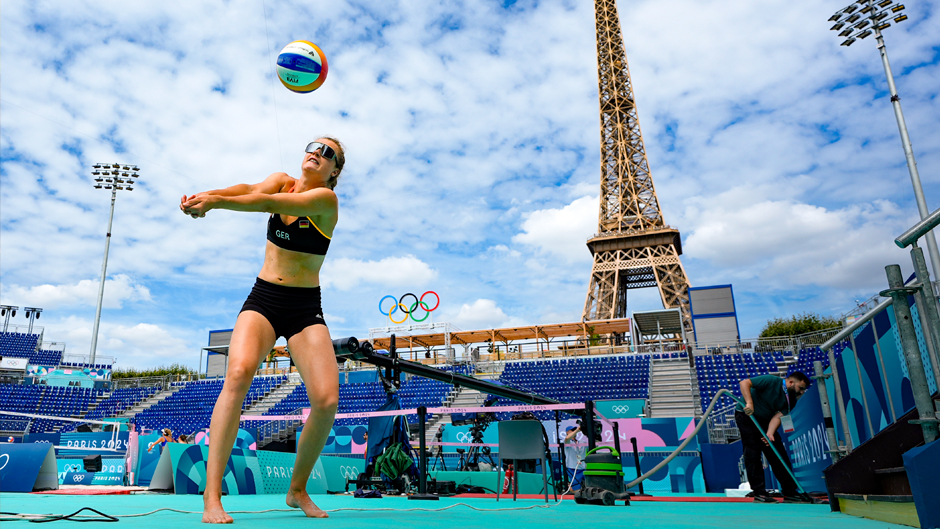Susan Peters Mullane remembers the electric adrenaline racing through her body as she prepared for a 10-meter dive and scaled the dive platform.
She recalls the reverse somersaults she took midair, before slicing into the deep pool just milliseconds later at 40 miles an hour.
And she can recall competing on national and international stages against divers like Cynthia Potter, who now serves as a dive commentator on NBC News during the Olympics.
So Mullane, now a veteran sport administration professor of professional practice at the University of Miami School of Education and Human Development, and an alumna of its successful women’s swimming and diving team in the 1970s, will definitely be tuning in to the opening ceremony of the Paris Olympic Games on Friday.
“I always love the Olympics, so I’ll be watching as much as I can,” said Mullane, who still swims for exercise about a mile each day and focuses her research on sports ethics. “People really need something like sports to bring them together, so the Olympics couldn’t come at a better time.”
Although she will undoubtedly be watching swimming and diving, Mullane will be looking out for the three University divers competing in events this summer, as well as the five other Hurricane Olympians competing in track and field, basketball, and volleyball. She also can’t wait to see Hurricane Russell Robinson compete in the triple jump for Team USA.
Both Mullane and her colleague, Tywan Martin, an associate professor of sport administration who studies sports communication, will watch for new events that may capture their attention. Like many viewers, they will be tuned in to gymnastics, and they will both be looking at how female athletes are incorporated more today, as well as how new changes to the Paris Games, like the elimination of baseball and softball, will play out.
Mullane said the Olympics has grown dramatically since its modern inception in 1896, when it featured nine sports and 43 events. Today the Games boast 329 events and 32 different sports, including some newer ones, like breakdancing, climbing, and skateboarding.
The faculty members share what events and athletes are at the top of their list.
What events will you be watching at the 2024 Paris Games and why?
Mullane: I will be watching swimming and all the men’s and women’s diving events, including synchronized diving, gymnastics, track and field, basketball, and some new sports like kayak cross, where kayakers must navigate a series of natural obstacles in very rough water. That should be exciting. The Olympics are also bringing in nontraditional sports because of their changing viewership, so this year there is breakdancing, which I’ll be watching out of curiosity.
Martin: I will be watching track and field, swimming and diving, and women’s gymnastics because of the record team they have this year with Simone Biles.
Also, because basketball was my love growing up, and I coached the sport for years, I’ll be watching men’s and women’s basketball. Women’s basketball in particular has consistently gotten better, and I will also be watching the marketing and advertising in this area during the Olympics since the WNBA has really elevated the production of this sport, and ESPN followed suit.
I’m also interested in tennis and beach volleyball, and I grew up breakdancing, so I’ll be watching that too. I’m interested to see how NBC will project that sport and to see how they will capture the attention of audiences and deliver this new sport to people.
Overall, I will be looking at how the media creates storylines about different sports—so if NBC creates an interesting story in fencing, rowing, or handball, then that sport will gain some prominence. I’ll also be looking at how brands align themselves with different sports.
Are there any specific athletes you’re interested in watching?
Mullane: Katie Ledecky—swimming for the USA is just phenomenal. She is on my list of people to watch because she has broken records in four events that are all very different, and she is one of the only athletes that can do all these things at her level. She might even break new records this summer. I also want to watch Team USA swimmer Caeleb Dressel, and Simone Biles in women’s gymnastics. In basketball, I am interested to see if Caitlin Clark will play as an alternate on the women’s team. I’ll also definitely be interested to see the French basketball player, Victor Wembanyama, who is 7 feet, 2 inches tall and plays for the San Antonio Spurs in the NBA.
Martin: I’ll be watching sprinter Sha’carri Richardson, who was disqualified from the 2020 Olympics after testing positive for cannabis, so her comeback will be interesting.
It’s a shame that the women’s basketball team will not have Caitlin Clark on its regular roster. Women’s USA basketball could have used her spirit, but if you look at the roster they have, it would be hard to remove anyone.
I’ll also be watching our University of Miami athletes.
How have things changed with the Olympic Games over time?
Mullane: It took a long time, but women have been given more access to compete in Olympic events with time—they even outnumbered the male athletes at the last Summer Games in Tokyo. That’s a big change because in the beginning of the Olympics, women were relegated to croquet and gymnastics. Then in the 1970s, beach volleyball was added, and many other women’s sports came after.
Another interesting thing is that since the Games are in Paris this summer, there is a focus on sustainability, and the city is trying not to build so many brand-new venues but instead using facilities that exist already.
Martin: Female athletes are drawing audiences, so I do think there’s quite an opportunity for women in sports now, and that includes sponsorships. This is a great time for them and for the brands that get in now, especially with women’s basketball. It’ll pay massive dividends in the future.

